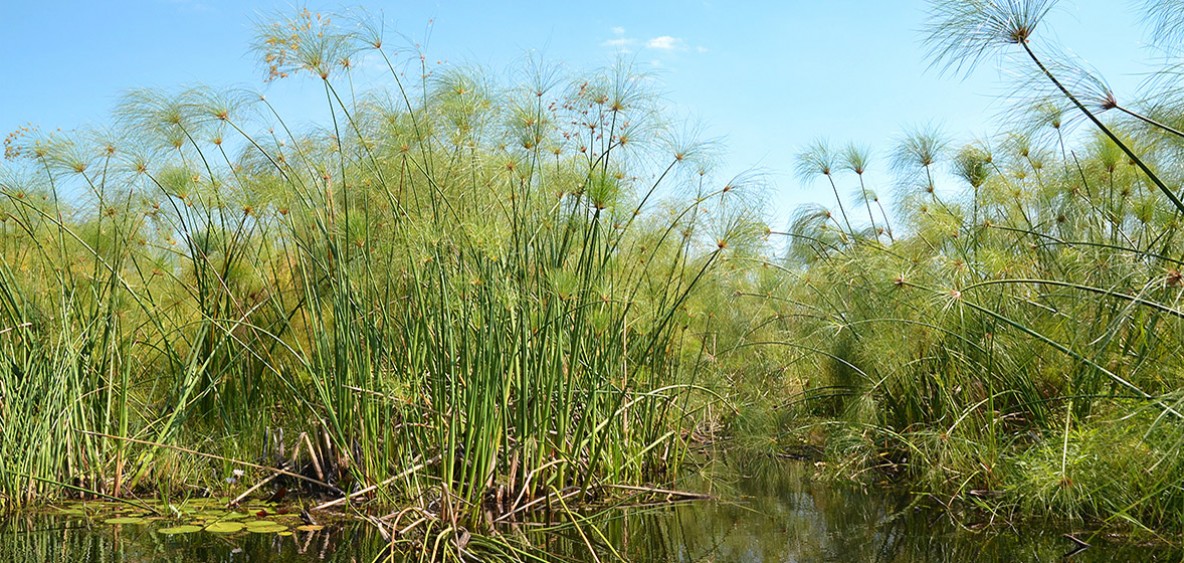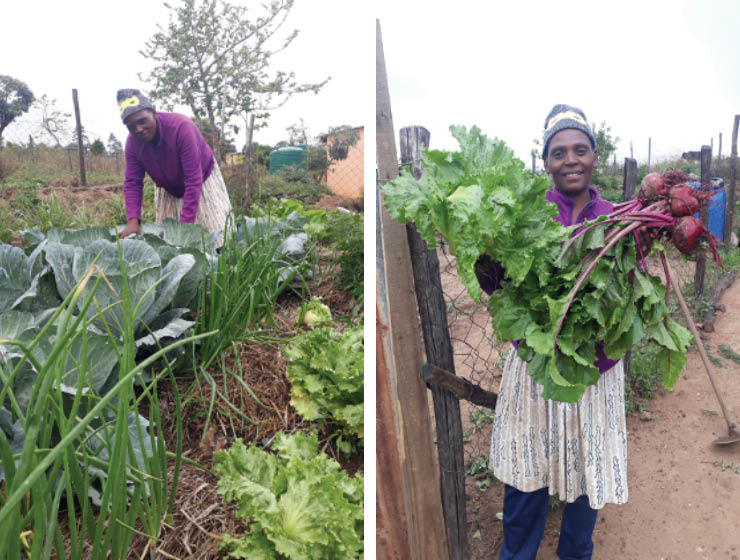
The RFS Eswatini project recently won a coveted Temvelo Award in biodiversity, an annual prize that goes to a deserving organisation working in biodiversity protection, land restoration and ecosystem rehabilitation. The award recognises the significant achievements the project has made in wetland, forest and agricultural land restoration.
The colourful zig-zagged baskets on display at markets in the Shiselweni region of Eswatini have a story to tell. They have their origins in a humble sedge that grows in the country’s wetlands. Women from the surrounding areas harvest this wiry grass as material for the products they weave, and then sell.
Due to the decline of Eswatini’s natural wetlands, this grass is becoming increasingly hard to find. For the local women, the disappearance of indigenous flora and fauna threatens their ability to make a living from their craft. For some, this loss of income translates to loss of independence and empowerment.
In Eswatini, wetlands are home to a rich diversity of animal and plant life. These species, valuable in their own right, are essential for maintaining healthy ecosystem functioning for surrounding communities. Wetlands help regulate changes in climate and provide a crucial source of water for livestock and communities.
The RFS Eswatini project helps communities protect and rehabilitate the country’s wetlands. In Ngololweni, the project fenced off the 30 hectares of a wetland to keep grazers out and allow vegetation regrowth.Rehabilitation has brought back many of the indigenous fauna and flora. Owls, rabbits and insects are returning to the area. Different species of Cyperus, Helichrysum, and Coleochloa Setifera are growing again.
The harvesting of grasses is now regulated by local natural resource committees. Community members are allowed to harvest once a year. Thanks to the new regulations, and the rehabilitation efforts, the harvests have multiplied. The local artisans have more materials for weaving, which means more products to sell and greater incomes.
“One of the main economic activities, particularly for women around wetlands, is the harvesting of grass to make food baskets, sleeping mats and bags which they sell to boost their household incomes,” said a beneficiary of the Ngololweni wetland rehabilitation project.
Through its strong focus on engaging women and youth entrepreneurs, the RFS Eswatini project aims to help communities gain food and nutrition security, and to improve their livelihoods through promoting environmentally sustainable and climate-resilient on- and off-farm income generating activities.
This work has earned the RFS Eswatini project a 2020 Temvelo Award in biodiversity conservation. The Temvelo Awards programme is an annual programme that recognises deserving organisations for their achievements in biodiversity protection, land restoration and ecosystem rehabilitation.
Organised by the Ministry of Tourism and Environmental Affairs, the Temvelo judging panel considers entries that demonstrate exceptional environmental stewardship through mentorship and training.
In addition to successful wetlands restoration in Ngololweni, Ntondozi, kaPhunga, and Nhlalabantfu, RFS Eswatini is contributing to biodiversity conservation through engaging communities in sustainable forest management. The project has established a 47-hectare conservation area in the Ngcamphalala Chiefdom, overlooking the Lubovane irrigation reservoir. The community is working to regrow the flora that was destroyed by deforestation, which was accelerated during the construction of the reservoir.
In the surrounding communities, the project has established apiaries and is training community members in modern beekeeping practices. In addition to growing the local value chain for bee products—honey, beeswax, pollen, propolis—training in beekeeping is raising community awareness of the connection between bees, forest health and agricultural productivity. Through beekeeping, community members are encouraged to become custodians of the emerging flora because of the knock-on benefits for the health of their bee colonies.

On farm, conservation agriculture and permaculture practices are restoring biodiversity above and below the soil. Farmers have already experienced the benefits of switching to farming methods that facilitate the growth of micro-organisms. These micro-organisms improve soil fertility and keep the soil warmer during colder months, protecting crops from frost.
“We get severe frost, which has affected our crops and gardens,” says Ms Nkumane from Magele, another beneficiary of the RFS project. “Because of permaculture, my garden was not burnt by the frost. It’s because the organisms below the crops create fertility. They sweat and the heat reaches the crops above. How can snow settle on a hot leaf?”
Conservation activities have been successful in large part due to community involvement. Communities within catchment areas have been encouraged to come together to collectively plan and implement rehabilitation efforts at catchment-level. Members of RFS project communities, equipped with new knowledge and experience, have become trainers themselves.
“The communities are huge believers in the value of the environment,” says Lynn Kota, Project Coordinator for the RFS Eswatini project. “The trick is how they use these resources.”
Communities outside of the RFS project implementation area have started adopting successful approaches with support from RFS-trained community-based facilitators. Some communities have even started to independently source additional financing from other funders, including the National Environment Fund, to expand rehabilitation efforts initiated by the RFS project.
For Ms. Kota, the scaling up of rehabilitation efforts is evidence that communities are seeing the benefits of sustainable approaches. “Communities are learning: if you treat the environment well, the environment will reward you with healthy soils, clean air, abundant water, medicinal plants, and plenty of food.”
Subscribe to our monthly newsletter to receive updates on stories directly from the field across all our projects, upcoming events, new resources, and more.